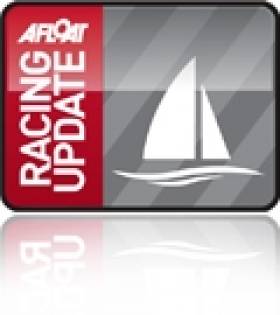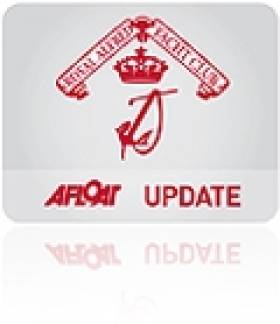Displaying items by tag: Dragon
Irish Dragons Roar in Cowes
Irish eyes were smiling on day two of the 2010 Dragon Edinburgh Cup, supported by Aberdeen Asset Management, as Simon Brien, sailing IRL212 Kin with Stephen Milne and David Gomes, won race three. Hot on their heels came Andrew Craig, sailing IRL192 Chimaera with Mark Pettitt and Brian Matthews, who won race four of the six race series. It was a very challenging day with the wind constantly flicking around between 200 and 225 degrees and varying from lows of 6-8 knots to highs of circa 17 knots.
If there was ever a day of yachting snakes and ladders this was it. The Royal Corinthian Yacht Club's Race Committee headed by PRO Robert Lamb, had their work cut out to keep the courses as fair as possible and at every mark rounding there were significant position changes throughout the fleet.
After his all-conquering open day, Poul Richard Hoj-Jensen, sailing GBR745 with Theis Palm and Andrew Norden, found himself under considerably more pressure today. He had moments of absolute brilliance and led race four by a significant margin at one point, but ultimately he finished the day by adding a fifth and a third to yesterday's two wins.
That was sufficient to keep him in the overall lead, but with the discard coming into play after race four that lead is now reduced to three points from Germany's Klaus Diederichs* sailing NOR282 Fever with Andy Beadsworth and Simon Fry. Beadsworth and Fry both call the Solent home and have won multiple championships in these waters between them. Their combined experience and local knowledge added to Diederichs' undoubted abilities as a helm made them boat of the day with a 4, 2 score line.
Simon Brien's impressive win in the third race, where he led almost from start to finish despite constant challenges, combined with an 11th in race four takes him from sixth to third overall, seven points behind Diederichs. Meanwhile fourth race winner Andrew Craig, who had finished eighth in race three, moves on to equal points with Brien but takes fourth on count back.
Lawrie Smith, Ossie Stewart and Bill Masterman, sailing GBR751 Alfie, had a tricky opening race finishing fourteenth, but things looked even worse in race four when they found themselves rounding the first mark well into the 20s. Things didn't look much better down the first run, but on the second beat they banged the right corner hard, found a nice little patch of stronger breeze and simply sailed round the fleet and up into sixth place.
Overall that drops them down from third to fifth where they are tied on points with sixth placed Len Jones, sailing GBR708 Rumours with Pedro Andrade and Philip Catmur. Jones had finished ninth in race three and at one point in race four was running neck and neck with Hoj-Jensen ahead of the entire fleet, but a missed shift saw him holding on as Hoj-Jensen gybed off and he'd lost half a dozen places in a matter of minutes before fighting his way back to fourth on the final beat.
Thirteen may be a lucky number for some, but sadly not for Jamie Lea, sailing for Quentin Strauss aboard GBR723 Gorgeous Worgeous with Lars Wegener. They went into the day in fifth place, but their neatly matched pair of thirteenth places means they move down into 11th overall. Olga White was all sixes and sevens as well (well sixth in race three and seventh in race four) meaning that she has dropped down from fourth place into seventh.
There was high drama during race four when Gavia Wilkinson-Cox, sailing GBR716 Jerboa with Mark Hart and Henry Bagnall, and Mikahil Muratov, sailing RUS96 Murka 8 with Vladimir Krutskikh and V Uvarkin, who had gone into the day lying in 9th and 10th respectively, came together on the second beat. Wilkinson-Cox was on starboard and Muratov on port, and initially it looked as if Muratov was going to pass ahead, but an apparent miscommunication resulted in the two boats coming together and their rigs became fatally entwined. After several terrifying pirouettes during which Jerboa came close to being towed under, the rig of Murka 8 finally collapsed, missing Henry Bagnall by a whisker on the way down, and the two boats were able to extricate themselves. Fortunately support RIBs were immediately on hand to assist and no one was injured in the incident.
Back ashore the protest committee found fault on both sides and disqualified both boats from the race. We apologise for not being able to bring you the results of the Corinthian Division in today's report, but an administrative problem has meant that the list of those eligible to race as Corinthians is incomplete and at the time of going to press we await updated results.
After racing the crews joined their sponsor Aberdeen Asset Management and their guests for a delightful drinks party at the Sir Max Aitken Museum housed in The Prospect, a converted 18th century waterside sail loft. A newspaper magnate, world war two fighter pilot, racing yachtsman, powerboat pioneer and founder of the London Boatshow, Sir Max created the museum in his former Cowes home in 1979 and it houses a fascinating collection of marine artifacts. The Mayor of Cowes Councillor Alan Wells and his wife Jenny attended the event and Mrs Wells kindly presented the prizes at the daily awards ceremony.
Tomorrow there will be one championship race followed by the traditional Edinburgh Cup crew's race - and with a crew list that includes the likes of Andy Beadsworth, Ossie Stewart, Graham Bailey and Martin Payne that crew's race is likely to be as cut and thrust as any other this week. The regatta concludes on Saturday.
Overall Top Six After Four Races
1. GBR745 - Danish Blue - Poul Richard Hoj-Jensen - 5 pts
2. NOR272 - Fever - Klaus Diederichs - 8 pts
3. IRL212 - Kin - Simon Brien - 15 pts
4. IRL192 - Chimaera - Andrew Craig - 15 pts
5. GBR751 - Alfie - Lawrie Smith - 16 pts
6. GBR708 - Rumours - Len Jones - 16 pts
There was a familiar ring to this evening's Royal Alfred prizegiving roll call where Baily Bowl trophies were presented to top ranked sailors in four separate classes.
A weekend of one design class action produced a testing five race series. Light to medium north-westerlies prevailed with some big shifts coming off the Dublin bay shoreline making for plenty of place changes both upwind and downwind on well laid, windward-leeward courses.
The competition was hosted by the National YC due to marina replacement works at the Royal St. George YC.
SB3's and Dragons raced on one course in the middle of the bay while the Flying 15's and Squibs race in Seapoint Bay, so close to the Sandymount shore on Saturday that the weather mark was laid in only nine foot of water.
The event - were it required - confirmed that the SB3 is the most popular one design in the country, the class producing a fine fleet of 22 boats almost twice the size of the other three fleets.
Allthough Howth's Ben Duncan, sailing Sharkbait, continues his domination of the class it was good to see Bray Sailing Club''s Marty Cuppage in third overall, one place behind Belfast Lough's David Cheyne.
Local favourite Sean Craig sealed his fate on Saturday when he counted a premature start penalty (OCS) in the afternoon race but neverthless a final race win today moved him to sixth overall.
If the SB3 is the most popular class then it has most likely been at the cost of the Dublin Bay Dragon fleet where weekend numbers did not make double figures. Rick Johnson sailing Diva continued his recent Dublin Bay form beating Andrew Craig's Chimaera who finished second and Peter Bowring's Phantom in third.
The National Yacht Club's John Lavery was the clear winner (three race wins) of the Flying fifteens where a dozen boats sailed. It was Northern Ireland travellers Andy Martin in second and Brian McKee third in a fleet otherwise made up from the local Dublin Bay class. It was disappointing turnout in some respects because the local fleet numbers almost 30 boats and the Baily Bowl doubled as a class championship.
In preparation for next month's British and Irish Squib Championships at the same venue the Royal St. George's Vincent Delany took a well earned win with three race wins in his final tally. Peter Wallace sailing Toys for the Boys was second and Lola (Frank Whelan) was third.






























































